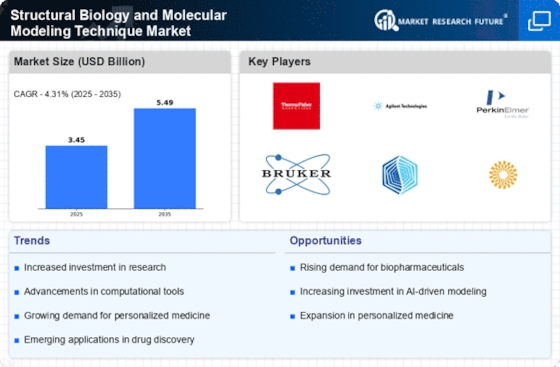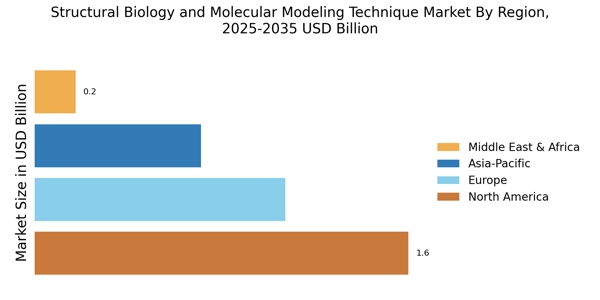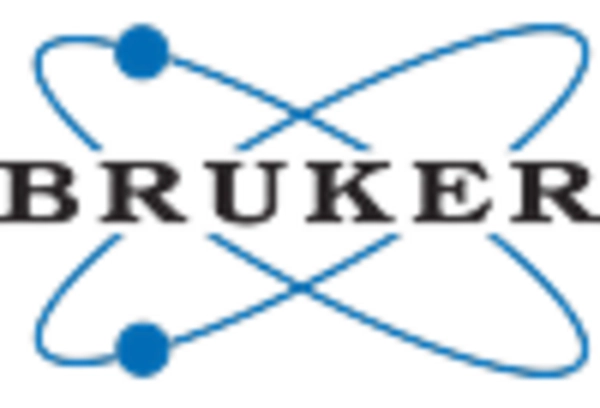Rising Demand for Drug Discovery
The Structural Biology and Molecular Modeling Technique Market is experiencing a notable increase in demand for drug discovery processes. Pharmaceutical companies are increasingly relying on structural biology techniques to identify potential drug candidates and optimize their efficacy. The market for drug discovery is projected to reach USD 60 billion by 2026, indicating a robust growth trajectory. This demand is driven by the need for more efficient and cost-effective drug development processes, which structural biology can facilitate through advanced molecular modeling techniques. As the industry seeks to reduce time-to-market for new therapeutics, the integration of structural biology into drug discovery workflows becomes essential, thereby propelling the market forward.
Advancements in Computational Power
The Structural Biology and Molecular Modeling Technique Market is significantly influenced by advancements in computational power. The increasing availability of high-performance computing resources enables researchers to conduct complex molecular simulations and analyses that were previously unattainable. This enhancement in computational capabilities allows for more accurate modeling of biological systems, which is crucial for understanding molecular interactions and dynamics. As a result, the market is expected to grow at a compound annual growth rate of approximately 10% over the next five years. The ability to perform large-scale simulations and analyze vast datasets is likely to drive innovation in structural biology, making it a pivotal factor in the market's expansion.
Increased Investment in Biotechnology
The Structural Biology and Molecular Modeling Technique Market is benefiting from increased investment in biotechnology. Venture capital funding and government grants are being directed towards research and development in structural biology, which is essential for the advancement of biopharmaceuticals and therapeutic interventions. In 2025, investments in biotechnology are expected to exceed USD 500 billion, reflecting a strong commitment to innovation in this sector. This influx of capital is likely to enhance the capabilities of structural biology and molecular modeling techniques, fostering collaborations between academic institutions and industry players. As a result, the market is poised for substantial growth, driven by the need for innovative solutions in drug development and disease understanding.
Growing Focus on Personalized Medicine
The Structural Biology and Molecular Modeling Technique Market is witnessing a growing focus on personalized medicine, which tailors medical treatment to individual characteristics. This trend is largely driven by advancements in genomics and proteomics, which provide insights into the molecular basis of diseases. Structural biology plays a critical role in this paradigm shift by enabling the design of targeted therapies based on the structural understanding of disease-related proteins. The market for personalized medicine is projected to reach USD 2 trillion by 2025, highlighting the potential for structural biology techniques to contribute significantly to this field. As healthcare moves towards more individualized approaches, the demand for structural biology and molecular modeling techniques is likely to increase.
Emerging Applications in Synthetic Biology
The Structural Biology and Molecular Modeling Technique Market is expanding due to emerging applications in synthetic biology. This interdisciplinary field combines biology and engineering to design and construct new biological parts, devices, and systems. Structural biology techniques are crucial for understanding the molecular architecture of synthetic constructs, which can lead to novel applications in medicine, agriculture, and environmental science. The synthetic biology market is projected to reach USD 40 billion by 2026, indicating a burgeoning interest in this area. As researchers seek to harness the power of structural biology for synthetic applications, the demand for molecular modeling techniques is likely to grow, further driving the market's evolution.

















